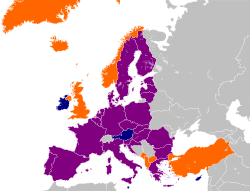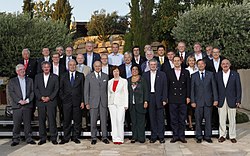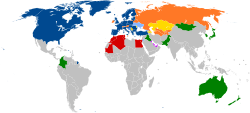Cyprus–NATO relations
 From Wikipedia - Reading time: 13 min
From Wikipedia - Reading time: 13 min
 | |
NATO |
Cyprus |
|---|---|
 |
|---|


| NATO member countries Accession protocol signed Countries in the process of accession Countries promised invitations | Membership is not the goal Countries have not announced their membership intentions |
Cyprus is one of four European Union (EU) member states which is not a member of the North Atlantic Treaty Organization (NATO), and the only one not to participate in NATO's Partnership for Peace (PfP) program.[1][2][3] The others are Austria, Ireland and Malta.
History
[edit]1949–1960: Period within NATO as a British crown colony
[edit]When NATO was founded in 1949, Cyprus was a crown colony of the United Kingdom and as such the UK's NATO membership also applied to British Cyprus.[4][5]
In 1955 the Cyprus Emergency began, with Greek Cypriots waging an armed campaign to end British colonial rule and union with Greece. This led to intercommunal violence between Greek and Turkish Cypriots, who opposed a union with Greece and instead fought for partition and partial union with Turkey. The London and Zürich Agreements of 1959 ended the conflict and led to Cyprus gaining its independence from the UK in 1960, but ruled out both a union with either Greece or Turkey and partition. The Sovereign Base Areas of Akrotiri and Dhekelia in Cyprus remained under British control as a British Overseas Territory following the independence of Cyprus.[6][7][8]
1960–2004: Independence and non-alignment
[edit]
Following its independence, neighbouring Greece and Turkey (both NATO members) competed for influence in Cyprus.[9][10][11] The first President of the independent Republic of Cyprus, Archbishop of Cyprus Makarios III, attempted to maintain good relations with both states. While Greece and Turkey had agreed to support Cyprus joining NATO during negotiations for its independence,[12] Makarios adopted a policy of non-alignment.[13] In 1961 he took part in the founding meeting of the Non-Aligned Movement in Belgrade.[14][15]
In 1974 Greece supported a Cypriot coup d'état, which ousted Makarios and replaced him with Nikos Sampson who aimed to unify the island with Greece. In response, Turkey invaded Cyprus. While Makarios secured international recognition of his administration as the legitimate government of the whole island of Cyprus, Turkey continued to occupy Northern Cyprus. In 1983 the Turkish Republic of Northern Cyprus was established as a separate state, but it has only been recognized by Turkey.[16][17]
Since the 1974 invasion, the main foreign policy goal of the Republic of Cyprus has been to secure the withdrawal of Turkish forces and the reunification of the island under the most favorable constitutional and territorial terms possible.[18][19] This campaign has been pursued primarily through international forums such as the United Nations and the Non-Aligned Movement, and in recent years the European Union.[20][21][22]
2004–present: European Union membership
[edit]


While Cyprus had historically followed a non-aligned foreign policy, it increasingly identified with the West in its cultural affinities and trade patterns, and maintains close relations with the rest of the European Union (including Greece), as well as Armenia, Lebanon, and Russia.[23][24][25] One of the requirements of the accession of Cyprus to the European Union in 2004 was for it to leave the Non-Aligned Movement.[26][27][28]
Cyprus is one out of four European Union (EU) member states outside the North Atlantic Treaty Organization (NATO), and the only one not to participate in NATO's Partnership for Peace (PfP) program.[29][1][30]
Since the entry into force of the Treaty of Lisbon in 2009, the EU mutual solidarity clause applies to Cyprus along with other EU member states:[31][32]
If a Member State is the victim of armed aggression on its territory, the other Member States shall have towards it an obligation of aid and assistance by all the means in their power, in accordance with Article 51 of the United Nations Charter. This shall not prejudice the specific character of the security and defence policy of certain Member States. [...]
Article 42.2 specifies however that NATO shall be the main forum for the implementation of collective self-defence for EU member states that are also NATO members.[33] The other EU member states that are outside NATO resort to the EU's Common Security and Defence Policy (CSDP, which has a much smaller structures and capabilities than NATO's command structure) for the implementation of collective self-defence are Austria, Ireland, and Malta.[citation needed]
Integration into NATO
[edit]The ongoing Cyprus dispute complicates Cyprus' relations with NATO.[34][35] Any treaty concerning Cyprus' participation in NATO, either as a full member, PfP or Euro-Atlantic Partnership Council, would likely be vetoed by Turkey, a full member of NATO, unless the dispute is resolved first.[36][37]
NATO membership for a reunified Cyprus has been proposed as a solution to the question of security guarantees, given that all three of the current guarantors under the Treaty of Guarantee (1960) (Greece, Turkey and the United Kingdom) are already NATO members.[38][39]
The Parliament of Cyprus voted in February 2011 to apply for membership of NATO's Partnership for Peace program. However, President Demetris Christofias vetoed the decision, arguing that it would hamper his attempts to negotiate an end to the dispute and demilitarize the island.[40][41]
Nicos Anastasiades, who was elected President in 2013, stated that he intended to apply for membership in the PfP program soon after taking over.[42][43] His foreign minister Nikos Christodoulides later dismissed Cypriot membership of NATO or Partnership for Peace, preferring to keep Cyprus' foreign and defence affairs within the framework of the EU, i.e. the Common Security and Defence Policy (CSDP).[44][45] In May 2022, defence minister Charalambos Petrides confirmed that the country would not apply to NATO despite the Russian invasion of Ukraine.[46]
After the 2023 presidential election, Anastasiades' foreign minister Christodoulides succeeded him as President. In November 2024, Christodoulides reversed his previous stance and revealed a plan to deepen Cyprus' relations with NATO and eventually join as a full member. Under the first phase of the plan, Cyprus would seek to join preparatory organisations linked to NATO, which would require progress in resolving the Cyprus dispute with NATO member Turkey and improvements to EU–Turkey relations. Practical steps of the plan include securing a longer-term exemption from the U.S. arms embargo, expanding joint military training opportunities for the Cypriot National Guard at U.S. military academies, and modernisation of Cyprus' defence infrastructure to meet NATO standards.[47][48] Christodoulides stated that "the U.S. response has been very positive" and that these steps "will ensure that, once all conditions are met, Cyprus can join NATO".[49][50]
Cyprus's foreign relations with NATO member states
[edit]Since NATO member ![]() Turkey does not recognize the government of the Republic of Cyprus, Cyprus does not have diplomatic relations with Turkey.
Turkey does not recognize the government of the Republic of Cyprus, Cyprus does not have diplomatic relations with Turkey.
See also
[edit]- Foreign relations of Cyprus
- Cyprus and the Non-Aligned Movement
- Cyprus in the European Union
- Cyprus problem
- Foreign relations of NATO
- Enlargement of NATO
- Partnership for Peace
- Neutral member states in the European Union
- European Union–NATO relations
- Cyprus–Greece relations
- Cyprus–United Kingdom relations
- Cyprus–United States relations
NATO relations of other EU member states outside NATO:
References
[edit]- ^ a b "What 6 countries are not in NATO?". Archived from the original on 13 March 2023.
- ^ Wemer, David (1 April 2019). "NATO membership for Cyprus. Yes, Cyprus". Atlantic Council. Retrieved 13 March 2023.
- ^ Canada, NATO Association of (21 March 2013). "Partners for Peace?: Cyprus, NATO and the EU". NAOC. Retrieved 14 March 2023.
- ^ "On this day 16th August | Royal Signals Museum". Retrieved 13 March 2023.
- ^ Smith, Helena (9 May 2022). "Deal allows Cyprus to develop land in British sovereign base areas". The Guardian. ISSN 0261-3077. Retrieved 14 March 2023.
- ^ "Cyprus Sovereign Base Areas". UK Overseas Territories Conservation Forum. Archived from the original on 29 April 2022. Retrieved 6 May 2022.
- ^ "Αυτοί είναι οι χάρτες των πολεοδομικών ζωνών στις Βάσεις (Pdf)". www.brief.com.cy. Retrieved 13 March 2023.
- ^ "Οι βρετανικές βάσεις στην Κύπρο". NGradio.gr (in Greek). 31 July 2013. Retrieved 13 March 2023.
- ^ "US. JOINS BRITAIN IN MOVE TO SEND FORCE TO CYPRUS; Turkey Assents and Greece Is Reported Agreeable to NATO Peace Unit". The New York Times. 1 February 1964. ISSN 0362-4331. Retrieved 13 March 2023.
- ^ "Greece Withdrawing Units From NATO to Aid Cyprus". The New York Times. 18 August 1964. ISSN 0362-4331. Retrieved 13 March 2023.
- ^ "55 χρόνια από τους βομβαρδισμούς της Τηλλυρίας". euronews (in Greek). 8 August 2019. Retrieved 13 March 2023.
- ^ Tziarras, Zenonas (2022). The Foreign Policy of the Republic of Cyprus: Local, Regional and International Dimensions. Springer Nature. ISBN 978-3-030-91177-5.
The question of whether the RoC should join NATO or not came again to the fore during the Zurich Conference (5-11 February 1959) held by Greece and Turkey. One of the articles in the "Gentle- men's Agreement" concluded by Konstantinos Karamanlis and Adnan Menderes, the Prime Ministers of Greece and Turkey, respectively, stated that the two countries would support the accession of the RoC to NATO (Mallinson 2005, 49).
- ^ Newsroom. "Makarios: Charismatic leader or architect of catastrophe? | eKathimerini.com". www.ekathimerini.com. Retrieved 13 March 2023.
{{cite web}}:|last=has generic name (help) - ^ Hatzivassiliou, Evanthis (2005). "Cyprus at the Crossroads, 1959–63". European History Quarterly. 35 (4): 523–540. doi:10.1177/0265691405056875. S2CID 143884601.
- ^ "Belgrade, The 1961 Non-Aligned Conference | Global South Studies, U.Va". globalsouthstudies.as.virginia.edu. Retrieved 14 March 2023.
- ^ "The Moral Grounds for the EU's Obligation to End the Occupation of Northern Cyprus (ARI)". Elcano Royal Institute. Retrieved 13 March 2023.
- ^ "Cyprus country profile". BBC News. 1 March 2012. Retrieved 13 March 2023.
- ^ webteam (11 July 2017). ""Δίκαιη και βιώσιμη λύση του Κυπριακού συνεπάγεται κατάργηση εγγυήσεων και αποχώρηση των κατοχικών στρατευμάτων" | Ελληνική Κυβέρνηση" (in Greek). Retrieved 13 March 2023.
- ^ "Επιμονή σε λύση του Κυπριακού χωρίς εγγυήσεις και στρατό κατοχής". www.brief.com.cy. Retrieved 13 March 2023.
- ^ "Προεργασίες Χριστοδουλίδη για ενεργό εμπλοκή της ΕΕ στο Κυπριακό". Ant1live. 11 March 2023.
- ^ "Βλέπει θετικά ο Στιούαρτ την εμπλοκή ΕΕ στο Κυπριακό | Offsite". www.offsite.com.cy. Retrieved 13 March 2023.
- ^ "Πολιτικές προσωπικότητες της ΕΕ για εμπλοκή στο Κυπριακό". Stockwatch - Παράθυρο στην Οικονομία (in Greek). 7 March 2023. Retrieved 13 March 2023.
- ^ "Αναστασιάδης: Δεν θα μπορούσαμε εμείς να είμαστε το στίγμα της Ευρώπης". euronews (in Greek). 19 January 2023. Retrieved 13 March 2023.
- ^ Έλλις, Αθανάσιος (26 February 2023). "Νίκος Αναστασιάδης στην "Κ": Η Κύπρος, αξιόπιστος εταίρος της Δύσης". www.kathimerini.gr. Retrieved 13 March 2023.
- ^ Sigmalive. "ΠτΔ: Στενή η σχέση ανάμεσα σε Κύπρο και Λίβανο | News". www.sigmalive.com. Retrieved 13 March 2023.
- ^ Ker-Lindsay, James. "Shifting alignments: the external orientation of Cyprus since independence" (PDF). London School of Economics. 22 (2): 68.
- ^ "Cyprus and the EU – High Commission of Cyprus in the UK". Retrieved 13 March 2023.
- ^ "Cyprus and the EU". University of Nicosia Library. Retrieved 13 March 2023.
- ^ MATSAKIS, Marios. "Parliamentary question | Cyprus and Partnership for Peace (PfP) | E-0571/2009 | European Parliament". www.europarl.europa.eu. Retrieved 13 March 2023.
- ^ Tidey, Alice (24 May 2022). "As Sweden and Finland seek to join NATO, just 4 EU states could be left out of the alliance". euronews. Retrieved 14 March 2023.
- ^ "Cyprus ratifies Lisbon treaty". POLITICO. 4 July 2008. Retrieved 13 March 2023.
- ^ "Understanding the Lisbon Treaty". www.robert-schuman.eu. Retrieved 13 March 2023.
- ^ "Mutual defence clause (Article 42.7 TEU)" (PDF).
- ^ "NATO Is Viewed as Weakened by the War on Cyprus". The New York Times. 13 August 1974. ISSN 0362-4331. Retrieved 13 March 2023.
- ^ Sullivan, Jack (28 January 2023). "Only America Can Resolve the Cyprus Question". FDD. Retrieved 14 March 2023.
- ^ Dempsey, Judy (24 November 2010). "Between the European Union and NATO, Many Walls". The New York Times. Archived from the original on 31 March 2022. Retrieved 28 March 2014.
- ^ Dempsey, Judy (24 November 2012). "Between the European Union and NATO, Many Walls". New York Times. Retrieved 19 July 2012.
- ^ "NATO membership for Cyprus. Yes, Cyprus". Atlantic Council. 1 April 2019. Archived from the original on 29 May 2022. Retrieved 13 June 2022.
- ^ Wrießnig, Thomas. "Cyprus, Is one of the oldest conflicts about to be resolved?" (PDF).
- ^ "Cypriot parliament votes to join NATO's Partnership for Peace". SETimes. 25 February 2011. Retrieved 19 July 2012.
- ^ "Cyprus - Vouli Antiprosopon (House of Representatives)". Inter-Parliamentary Union. Retrieved 24 February 2013.
- ^ Kambas, Michele; Babington, Deepa (24 February 2013). "Cypriot conservative romps to presidential victory". Reuters. Retrieved 24 February 2013.
- ^ "Cypriots elect Anastasiades to presidency". POLITICO. 27 February 2013. Retrieved 14 March 2023.
- ^ "Cyprus dismisses reports on NATO scenarios". KNEWS - Kathimerini Cyprus. 5 June 2018. Retrieved 12 January 2020.
- ^ Solutions, BDigital Web. "Cyprus dismisses reports on NATO scenarios". knews.com.cy. Retrieved 13 March 2023.
- ^ "Cyprus will not apply for Nato membership at the moment def minister says". Daily Cyprus. 19 May 2022. Archived from the original on 19 May 2022. Retrieved 22 May 2022.
- ^ Αργύρη, Λένας (24 November 2024). "Βήμα βήμα προς το ΝΑΤΟ η Κύπρος". Kathimerini. Retrieved 8 December 2024.
- ^ "Cyprus moves closer to NATO, talks begin on permanent U.S. military presence". Kathimerini Cyprus. 25 November 2024. Retrieved 25 November 2024.
- ^ "Christodoulides: Once everything is in place, we want Cyprus to become a NATO member". Proto Thema. 28 November 2024. Retrieved 8 December 2024.
- ^ HADJICOSTIS, MENELAOS (28 November 2024). "Cyprus could become a member of NATO when conditions permit, the country's president says". Associated Press. Retrieved 8 December 2024.
 KSF
KSF
